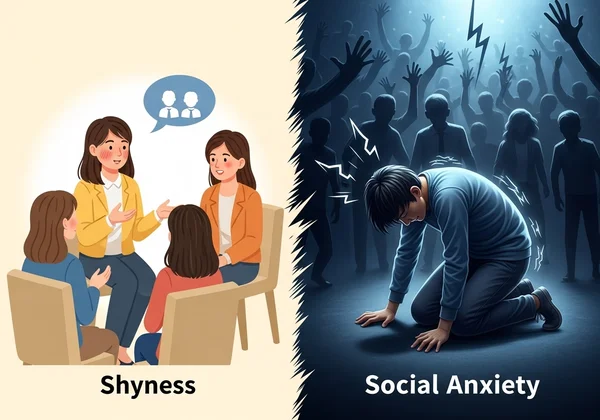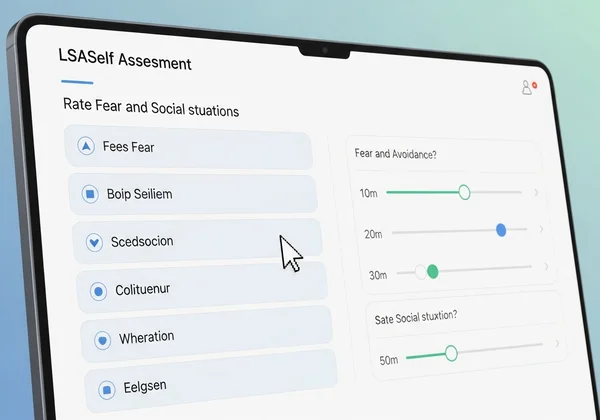Shyness vs. Social Anxiety: Understanding Your LSAS Score
July 21, 2025 | By Elara Donovan
Feeling a flutter of nerves before a big presentation or a bit awkward at a party full of strangers is a nearly universal human experience. For many, this is simply shyness—a personality trait that makes social navigation a little bumpy at times. But what if that feeling is more than just a flutter? What if it's a tidal wave of fear that dictates your choices, limits your opportunities, and shrinks your world? You might be asking yourself, "Do I have social anxiety or am I just shy?"
Understanding the distinction is crucial. One is a part of who you are, while the other is a treatable mental health condition. This guide will help you explore the key differences, empowering you with the clarity needed to understand your own experiences. Gaining this insight is the first step toward greater social comfort, and a confidential self-assessment can be a powerful tool to find your starting point.

Understanding Common Shyness: A Personality Trait
Shyness is a common personality trait, not a disorder. People who are shy may feel uncomfortable or inhibited in unfamiliar social situations, but this feeling doesn't typically cause overwhelming distress or disrupt their lives in a significant way. It's a pattern of behavior and feeling that can often be managed with time and familiarity.
What Does "Being Shy" Really Mean?
At its core, shyness involves a tendency to feel awkward or apprehensive during social encounters, especially with new people. A shy person might hesitate to speak up in a group or prefer listening to leading a conversation. However, once they warm up to a person or situation, this initial apprehension often fades away, allowing their true personality to shine through. The discomfort is temporary and situational, not a constant state of fear.
Common Characteristics of Shy Individuals
While shyness manifests differently for everyone, some common characteristics include:
- A tendency to be quiet or reserved in large groups.
- Feeling nervous or self-conscious when being the center of attention.
- Taking longer than others to acclimate to new social settings.
- Preferring smaller, more intimate gatherings over large parties.
- Despite feeling nervous, they can generally participate in required social activities like work meetings or school projects without debilitating fear.
Shyness might make certain interactions challenging, but it doesn't prevent a person from living a full and connected life.

What is Social Anxiety Disorder (Social Phobia)?
Social Anxiety Disorder, also known as social phobia, is much more than just shyness. It is a recognized mental health condition characterized by an intense and persistent fear of being scrutinized, judged, or embarrassed in social or performance situations. This fear is so profound that it can lead to complete avoidance of social scenarios, causing significant disruption to a person's daily life, career, and relationships.
Defining Social Anxiety as a Mental Health Condition
Unlike shyness, this mental health condition is marked by a fear that is disproportionate to the actual threat of the situation. A person with social anxiety isn't just worried about making a good impression; they are often terrified of saying or doing something they believe will lead to humiliation or rejection. This fear can be triggered by seemingly ordinary situations like making eye contact, eating in front of others, or using a public restroom.
Core Symptoms of Social Phobia
The core symptoms of social phobia are both psychological and physical. Individuals may experience:
- Intense, persistent fear or anxiety about specific social situations.
- Worrying about a social event for weeks in advance.
- A deep-seated fear of being negatively judged.
- Physical symptoms such as blushing, sweating, trembling, rapid heartbeat, or nausea.
- A tendency to critically analyze their own social performance after an event, dwelling on perceived flaws.
These symptoms are not just fleeting moments of discomfort; they are powerful reactions that feel uncontrollable and deeply distressing.
The Impact on Daily Life and Functioning
Here lies one of the most significant differences. While a shy person might feel uneasy giving a toast at a wedding, a person with social anxiety might turn down the invitation altogether to avoid the possibility. The impact on daily life can be severe, leading to missed job opportunities, difficulty forming friendships or romantic relationships, and academic underachievement. This avoidance reinforces the fear, creating a debilitating cycle.

Key Differences: Severity, Persistence, and Avoidance, as Measured by LSAS
Distinguishing between shyness and social anxiety often comes down to three factors: the severity of the fear, its persistence over time, and the degree of avoidance it causes. A helpful tool for exploring these factors is a structured self-assessment, like the Liebowitz Social Anxiety Scale.
When Normal Shyness Becomes a Disorder
The line is crossed when shyness becomes a disorder based on intensity and impairment. Shyness is feeling nervous; social anxiety is feeling terror. Shyness is hoping you don't say the wrong thing; social anxiety is being convinced you will, and that the consequences will be catastrophic. If social fear consistently prevents you from pursuing your goals or causes significant emotional pain, it may indicate something more than shyness.
The Role of Fear and Avoidance Behaviors
A hallmark of any anxiety disorder is the presence of powerful avoidance behaviors. A shy individual might attend a party and stick to the sidelines for a while. A person with social anxiety may invent an excuse to not go at all. This avoidance provides temporary relief but ultimately strengthens the anxiety in the long term. The fear of judgment becomes so overwhelming that avoiding the situation feels like the only safe option, which is a key pattern an LSAS test is designed to measure.
Recognizing When to Seek Further Clarity
If this discussion resonates with you, it's natural to want more definitive answers. Self-awareness is the first and most crucial step toward managing any mental health challenge and improving your well-being.
Reflecting on Your Experiences and Feelings
Take a moment for self-reflection. Think about recent social situations. Did you simply feel uncomfortable, or did you feel an intense wave of panic? Did you worry for days beforehand? Did you avoid the situation entirely? How much does this fear interfere with your work, education, or personal life? Answering these questions honestly can provide valuable clues.
How a Self-Assessment Can Provide Initial Insights
For those seeking a more structured way to understand their feelings, a social anxiety self-assessment can be an invaluable tool. The Liebowitz Social Anxiety Scale (LSAS) is a widely respected questionnaire designed specifically to measure the scope of social fears and avoidance. It guides you through 24 common situations, helping you quantify your feelings in a way that simple reflection cannot. Taking a free and confidential lsas online test can provide you with a clearer picture of where you stand.

Your Journey to Greater Social Confidence
In the end, the difference between shyness and social anxiety is a matter of degree. Shyness is a personality trait that adds a quiet color to your character, while social anxiety is a condition that can drain the color from your life. It's the difference between feeling nervous and being ruled by fear.
Recognizing this distinction is not about labeling yourself; it's about empowering yourself with knowledge. Understanding your unique experience is the first step toward building confidence and finding greater comfort in the social world. If you're ready to take that step, gaining a baseline understanding is key. Our platform offers a free, comprehensive LSAS assessment to help you on your journey. Discover your results now and move toward a more confident you.
Frequently Asked Questions About Social Comfort
Do I have social anxiety or am I just shy?
The key differentiator is impairment. Shyness may cause temporary discomfort, but social anxiety significantly interferes with your daily life, relationships, and responsibilities due to intense fear and avoidance of social situations. If fear consistently holds you back, it's worth exploring further.
What are the common signs of social anxiety?
Common signs of social anxiety include an intense fear of being judged, avoiding social gatherings, significant anxiety before social events, and experiencing physical symptoms like a racing heart, sweating, or trembling. After an interaction, people with social anxiety often spend a lot of time analyzing their perceived mistakes.
How can an LSAS test help me understand my social comfort?
An LSAS test provides a structured and objective measure of your social fears and avoidance behaviors across a range of common situations. Rather than just guessing, it gives you a score that helps quantify your experience. This score can be a valuable, private insight for self-reflection or a helpful starting point for a conversation with a mental health professional. You can try our free tool today to get a clearer understanding.
Disclaimer: This article is for informational purposes only. The LSAS test is an assessment tool, not a diagnostic one. The results cannot replace a diagnosis from a qualified healthcare professional. If you are struggling, please consider seeking guidance from a doctor or mental health provider.